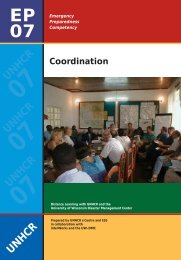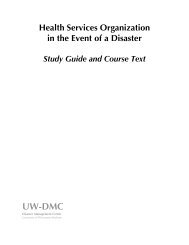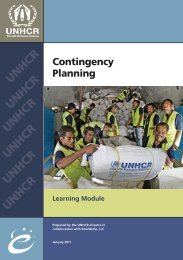Managing External Relations - Disaster Management Center ...
Managing External Relations - Disaster Management Center ...
Managing External Relations - Disaster Management Center ...
Create successful ePaper yourself
Turn your PDF publications into a flip-book with our unique Google optimized e-Paper software.
Reasons:<br />
Solutions:<br />
Chapter 2<br />
A large number of people in the group seem bored or unwilling to participate<br />
in the contingency planning meeting. What might be some of the reasons and<br />
solutions for this situation?<br />
Especially in contingency planning efforts, some agencies or people may feel that the content of the<br />
meeting is irrelevant to their current concerns, or that the group is not moving toward achieving their<br />
personal mandated goals. Materials may be too simple or too complex or there may be distractions<br />
such as other events going on at the same time. It may be time for a break if it has been longer than<br />
two hours, or there may be some underlying problem, such as a fear of speaking out due to the<br />
presence of dominating individuals. If necessary, review the goals that were set up at the beginning<br />
of the meeting and the agenda or timetable if there is one. Use humour to spark interest, call more<br />
frequent breaks, or direct questions toward less vocal persons.<br />
Resistance to Facilitation<br />
People seem to be resisting you as the facilitator and are criticising your<br />
methods. What might be the reasons for the resistance? What steps can you<br />
take to address the problem?<br />
It may be possible that you took too dominant of a role in the beginning and did not firmly establish<br />
that the entire group is responsible for the content and outcome of the meeting. Therefore, it may<br />
be necessary to discuss the nature of your role as facilitator. The facilitator may also become a<br />
scapegoat for the failures or problems of the group. This can be a constructive situation so it is<br />
important to not be defensive and to listen to the feedback from the group, being sure to hear a<br />
variety of opinions and to note your own frustrations with the meeting. You can hold a calm<br />
discussion of what could have been done by both you and the group to have made it better and to<br />
make changes if possible. Note these criticisms for future consideration.<br />
EP<br />
04<br />
25








